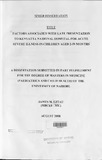| dc.contributor.author | Gitau, James M | |
| dc.date.accessioned | 2015-03-30T07:22:04Z | |
| dc.date.available | 2015-03-30T07:22:04Z | |
| dc.date.issued | 2008 | |
| dc.identifier.citation | A dissertation submitted in part fulfillment for the degree of masters in medicine (paediatrics and child health) of the University of Nairobi. | en_US |
| dc.identifier.uri | http://hdl.handle.net/11295/81771 | |
| dc.description.abstract | Background: Delay in seeking appropriate healthcare for ill children is an important
cause of morbidity and mortality especially for those aged below five years. Many factors
contribute to these delays. Understanding these factors in any particular setting is helpful
to enable the concerned health worker(s) address the caretaker concerns insofar as this
leads to late care seeking for illness with its subsequent implications.
Objective: To determine the factors associated with late healthcare seeking behaviour
among severely ill children aged 2-59 months presenting to Kenyatta National hospital.
Design: A hospital-based case control study.
Setting: The Paediatric filter clinic and the paediatric medical wards at the Kenyatta
National Hospital (KNH).
Subjects: Children aged 2- 59 months who were brought to the hospital with acute
severe illness and their caretakers. A total of 316 caretakers and their ill children were
enrolled into the study between November 2007 and February 2008.
Results: Of the 316 caretakers interviewed, 301 (95%) were mothers, the rest were other
relatives. Among their ill children, 177 (56%) were boys, the rest were girls. The median
age for the controls was 10 months, and 7 months for the cases. Symptoms of cough and
diarrhoea were likely to be associated with presentation later than 3 days with OR of2.09
(CI 1.23-3.56) and 1.57(CI 1.01-2.73) respectively. Herbal Medicine was used by 5% of
the study population and was associated with marked likelihood of late presentation [OR
41.7(CI 4.70-369.1)]. On outcome, there was enhanced chance of death in the cases
compared to the controls [OR 4.69 (CI 1.62-14.6)]. The median length of hospital stay
was longer for the cases (7 days vs 5 days) p=0.05.
Conclusion: Caretakers bringing their acute severely ill children later than 3 days since
illness onset to KNH are more likely to have explored other healthcare options first
compared to similarly ill children brought within 3 days. These severe presentations
include severe dehydration, severe respiratory distress among others. Cases had more
adverse outcomes in terms of mortality and length of morbidity as reflected by the longer
periods of hospitalization.
Recommendation: Education of mothers and health caregivers at the peripheral health
facilities on the aspects of community IMCI will promote timely referral for ill children. | en_US |
| dc.title | Factors associated with late presentation to Kenyatta National Hospital for acute severe illness in children aged 2-59 months | en_US |
| dc.type | Thesis | en_US |
| dc.description.department | a
Department of Psychiatry, University of Nairobi, ; bDepartment of Mental Health, School of Medicine,
Moi University, Eldoret, Kenya | |
| dc.type.material | en_US | en_US |

